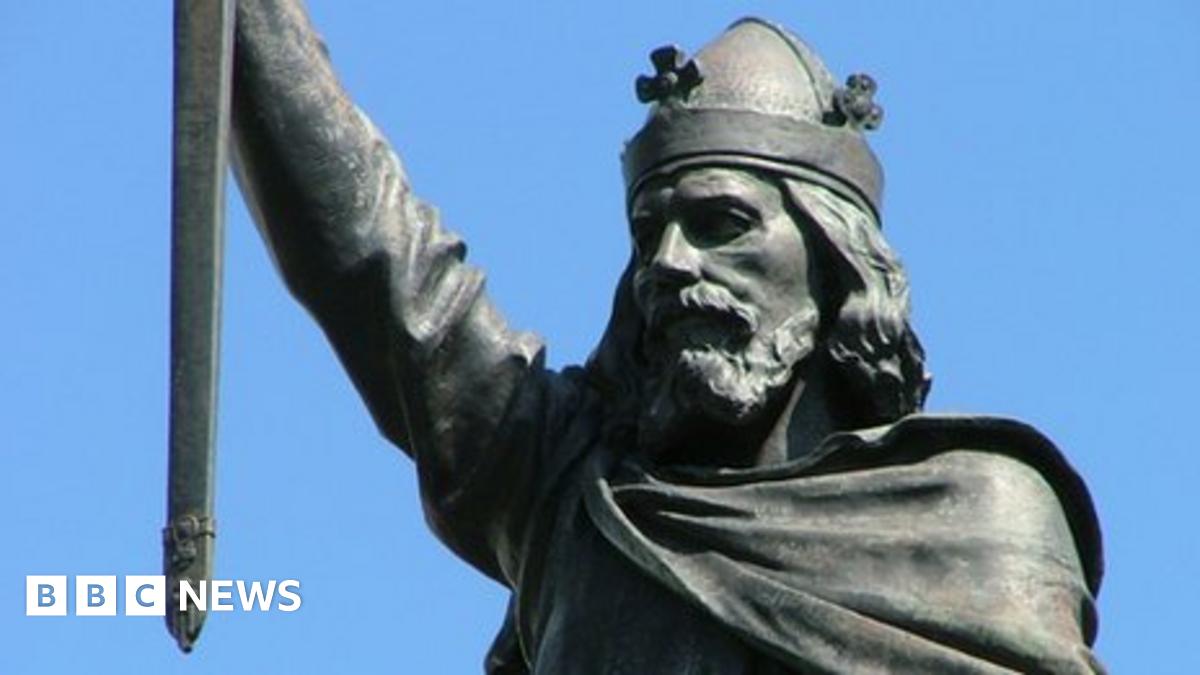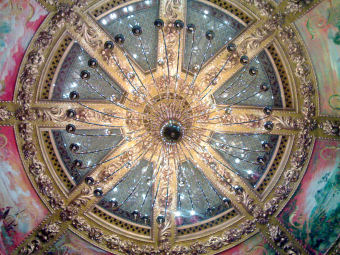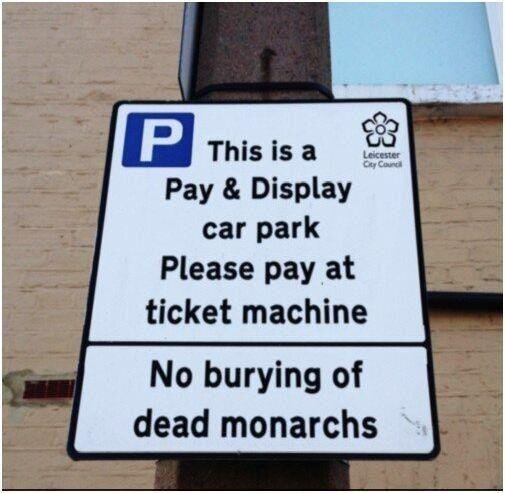Originally posted by MrGongGong
View Post
Richard the Third
Collapse
X
-
University of Winchester would like to dig up AlfredOriginally posted by mercia View Postso is Richard 3 the only one of our monarchs of whom we hadn't thus far known the burial place? or are there others to find ?
 An unmarked grave in a Hampshire church could be exhumed in the search for the remains of King Alfred the Great.
An unmarked grave in a Hampshire church could be exhumed in the search for the remains of King Alfred the Great.
I hadn't appreciated until watching that TV programme the other night how easy it is to observe one's own DNA - just saliva + washing-up liquid + salt + vodka [would gin do ? ]
I think I may need someone to explain why only the DNA of a descendant through the female line can be used
would my DNA not match the DNA of my paternal great-grandfather [for example] ?Last edited by mercia; 06-02-13, 05:17.
Comment
-
-
I think I watched the same programme. (Things can only get better.) Any alcohol will doOriginally posted by mercia View PostUniversity of Winchester would like to dig up Alfred
 An unmarked grave in a Hampshire church could be exhumed in the search for the remains of King Alfred the Great.
An unmarked grave in a Hampshire church could be exhumed in the search for the remains of King Alfred the Great.
I hadn't appreciated until watching that TV programme the other night how easy it is to observe one's own DNA - just saliva + washing-up liquid + salt + vodka [would gin do ? ]
I think I may need someone to explain why only the DNA of a descendant through the female line can be used
would my DNA not match the DNA of my paternal great-grandfather [for example] ? .
.
You don't only need maternal DNA. Identification of an individual needs both (see my post above, no. 225). Your paternal great-grandfather should have left his mark (although it's possible just that he hasn't - we inherit exactly half of each parent's genes, but any earlier ancestors' are divided on average. One eighth of our genes should, on average, come from our paternal great-grandfather, but any individual might have missed out because the father may not have passed any of them on).
As far as Alfred goes, we don't know exactly where he's buried. We're sure it's in Hyde Abbey, but not exactly where. (If your background is from 'The West', then you almost certainly carry some genes from Alfred the Great. Charlemagne too. In fact, anyone alive in the 800s, 900s or 1000s who has descendants living today is probably also your ancestor. And mine. Anyone alive about 3600 years ago who has descendants living today was probably an ancestor of everyone alive in the world today - the mind boggles.)Last edited by Pabmusic; 06-02-13, 08:16.
Comment
-
-
my mind is suitably boggledOriginally posted by Pabmusic View PostIn fact, anyone alive in the 800s, 900s or 1000s who has descendants living today is probably also your ancestor. And mine. Anyone alive about 3600 years ago who has descendants living today was probably an ancestor of everyone alive in the world today - the mind boggles.
shouldn't that mean that there is a huge amount of identical DNA around ?
Richard 3 would have the same DNA as his ancestors of 1000 years previously, from whom millions of people are descended Last edited by mercia; 06-02-13, 08:49.
Last edited by mercia; 06-02-13, 08:49.
Comment
-
-
The only people who have identical DNA are clones (we call them identical twins). We differ from each other by only minute amounts, but over large parts of our genome. What can be identified are long sequences that are identical, which indicates the two samples come from a common ancestor (this is how we can be sure that every living thing that we have tested is related to everything else; in particular we can identify chimpanzees and banobos as our closest cousins, because it is clear we shared a common ancestor with them more recently than with any other animal - 6 or 7 million years ago. It's also how we know that the closest cousin of whales is the hippopotamus).Originally posted by mercia View Postmy mind is suitably boggled
shouldn't that mean that there is far more identical DNA around ?
It's actually a version of the old tale about the person who asked for the amount of rice you get if you put one grain on the first square of a chess-board, two on the next, four on the next, eight on the next and so on. He ended up with more rice than grew in the whole world. There have not been enough people who have ever lived for it to have been possible for bloodlines to have been separate for very long. Of course the truth is more complicated than the crud(ish) mathematical model that accounts for the statistics I quoted. People do not reproduce evenly or randomly, for one thing. Certain cultures have very high frequency of intermarriage (but the effect of this is to bring the last common ancestor date forward, not push it back). Descendants vary a lot in the closeness of their relationships - I probably am an descendant of Alfred, but not because I descend from his bloodline through generation after generation. I certainly don't - mine was almost certainly a tangential union of two people, one of whom carried Alfred's genes, but neither party ever knew it because they were already so far from his bloodline.
Yes, that's so, although he wouldn't actually have has "the same DNA" because DNA gets shuffled every generation. I have miles and miles of DNA in every eukaryotic cell, stored in about 30,000 genes, which are arranged in 46 chromosomes. Exactly half came from my mother and half from my father (the two halves became the two strands of the double helix). But Mum also had about 30,000 genes, and she gave me only half of them, as did Dad, so my DNA is different since the pack's been cut. My sister received a different cut (that's why she's different from me), but it was still half from Mum and half from Dad. The same process has happened with each generation. When we use DNA to identify people by comparison, we are looking for repetitions of sequences over long stretches - the more there are, and the longer the stretches, the closer the relationship. We know that we are all related to (say) a willow tree because there will be some part of our DNA that is the same - it won't be much at all, but it is there. The probability of two things having such an identical stretch of DNA by chance is so infinitessimal that we can be confident that the willow tree and ourselves share a common ancestor - but an awfully long time ago.Originally posted by mercia View PostRichard 3 would have the same DNA as his ancestors of 1000 years previously, from whom millions of people are descended
Comment
-
-
Some fascinating and detailed stuff...Originally posted by Pabmusic View PostYou don't only need maternal DNA. Identification of an individual needs both (see my post above, no. 225).
So in a nutshell, how much credence do you give to the "identification" of RIII?
(Sorry if I've missed this earlier... hectic week!)"...the isle is full of noises,
Sounds and sweet airs, that give delight and hurt not.
Sometimes a thousand twangling instruments
Will hum about mine ears, and sometime voices..."
Comment
-
-
i think that it is highly credible evidence all told which leaves me feeling about 75% or so sure that it is he ..... enough to pop him in a cathedral and pull in the tourists i'd have thought
upon reflection i find the non DNA evidence more compelling [as adumbrated in #179 ] ... the DNA stuff [which can be wrong] is icing, but tis the cake that persuades ... the stories just fit ...According to the best estimates of astronomers there are at least one hundred billion galaxies in the observable universe.
Comment
-
-
The DNA tested so far is mitochondrial DNA. That shows the skeleton to be of the same maternal line as the two living subjects (who are presumably both known to be descendants of Richard III). The bones date from the right period and belonged to a man of about Richard's age at death. The man died violently, with wounds consistent with death in battle. The man had a crooked back and was slightly built - which is what was expected - and the burial is in the area predicted.Originally posted by Caliban View PostSome fascinating and detailed stuff...
So in a nutshell, how much credence do you give to the "identification" of RIII?
(Sorry if I've missed this earlier... hectic week!)
To my mind that's pretty conclusive, and I think they were OK to announce it as such, but we're waiting on the main DNA results. This will allow more accurate pinpointing of the identity, since it will have both maternal and paternal elements.
I wouldn't bet against its being Richard.
Comment
-
-
Pabmusic, what's your view about the possible merit of further scientific investigation of the two skeletons in Westminster Abbey believed to be those of the princes consigned to the Tower by RIII? Examination in 1933 suggested that they were skeletons of two young children, one aged 7-11 and the other 11-13 (which would match the ages of the princes). Would carbon dating and DNA testing - against the skeleton now believed to be that of RIII - be able to provide definitive identification? If so, that would almost certainly conclude the question of whether the princes died during RIII's reign or later, since the presumed age ranges of the skeletons would not allow for dates beyond 1485, and perhaps not even beyond 1483.
 The last Plantagenet king has always been blamed for the murders of the princes in the tower. But there are other suspects
The last Plantagenet king has always been blamed for the murders of the princes in the tower. But there are other suspects
The Church of England is still refusing forensic tests on the skeletons:
Comment
-
-
I think we'd get much useful information if we tested them again. Carbon dating would be useful, although the margin of error is enough to make the result unsatisfactory (we're talking about 3 years or so making a big difference in this case). New examination of the bones might confirm or cast doubt upon the ages of the children.Originally posted by aeolium View PostPabmusic, what's your view about the possible merit of further scientific investigation of the two skeletons in Westminster Abbey believed to be those of the princes consigned to the Tower by RIII? Examination in 1933 suggested that they were skeletons of two young children, one aged 7-11 and the other 11-13 (which would match the ages of the princes). Would carbon dating and DNA testing - against the skeleton now believed to be that of RIII - be able to provide definitive identification? If so, that would almost certainly conclude the question of whether the princes died during RIII's reign or later, since the presumed age ranges of the skeletons would not allow for dates beyond 1485, and perhaps not even beyond 1483.
 The last Plantagenet king has always been blamed for the murders of the princes in the tower. But there are other suspects
The last Plantagenet king has always been blamed for the murders of the princes in the tower. But there are other suspects
The Church of England is still refusing forensic tests on the skeletons:
http://www.guardian.co.uk/science/20...-staying-under
The big hope would be DNA testing. It would certainly disprove the relationship, if that is the case, and I'm sure it could prove it, too (though perhaps not as conclusively as any disproof). The good thing about royal families is that they're very well documented, so we have little doubt about the family tree. That's not the case with most people, so that identifying a particular person is very difficult, beyond establishing a relationship and roughly how close the relationship might be. The children were his nephews. If so, then Richard shared about a quarter of his DNA with each of them (this is on average - it's a bell-curve) so there'd be plenty to go on.
No doubt there are also new techniques that can be used to give more information than the 1933 examination.
One problem would be that, if they died in 1485, that might have been before or after Bosworth, but I'd be a little surprised if that distinction could be made.
Tantalising, though, isn't it?
Comment
-
-
Originally posted by Pabmusic View PostTo my mind that's pretty conclusive, and I think they were OK to announce it as such, but we're waiting on the main DNA results. This will allow more accurate pinpointing of the identity, since it will have both maternal and paternal elements.
I wouldn't bet against its being Richard. Cheers, Pab!
"...the isle is full of noises,
Cheers, Pab!
"...the isle is full of noises,
Sounds and sweet airs, that give delight and hurt not.
Sometimes a thousand twangling instruments
Will hum about mine ears, and sometime voices..."
Comment
-
-
Not neccessarily - there is some doubt about the paternity of Victoria, for example, based on the incidence of porphyria in the royal family before her & haemophylia after. 'Ordinary' people's ancestry is a pretty well documented as royalty through parish registers and the various registry offices.Originally posted by Pabmusic View PostThe good thing about royal families is that they're very well documented, so we have little doubt about the family tree. That's not the case with most people,
(However, I'm always somewhat doubtful about USA presidential candidates who trace their ancestry back to some hovel in Ireland)
Comment
-




 It should have said "No burying of dead monarchs after 1500"
It should have said "No burying of dead monarchs after 1500"

Comment